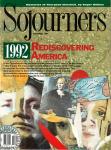"A partial step in the direction of awareness and theological reflection on the realities of life in the United States ... an attempt to share stories both in relationship to each other and within the context of peoples everywhere in the world committed to the praxis of liberation ... an attempt to give voice to the theological vision of those who are telling their stories and trying to sing the Lord's song in this complex, disparate, troubled land of ours." This is how the introduction describes the intent of Yearning to Breathe Free: Liberation Theologies in the U.S. And the book accomplishes well its intent.
Struggles for social, political, and economic justice by those who are oppressed within the belly of the beast have produced -- and are continuing to generate -- articulate, powerful, and deeply challenging theologies that expand and nourish the diverse body of "reflection on praxis" known as the theology of liberation.
From black liberation theology to mujerista, womanist, feminist, Native American, Asian American, and Jewish theologies, from Appalachia to the South Bronx and from Sing-Sing Prison to Justice House for the Homeless, from the United Farm Workers to Plowshares activists and sanctuary workers, Yearning to Breathe Free offers a glimpse at countless responses to the question "What has liberation theology got to do with America?" And this glimpse entices the reader to seek more ... to more deeply probe theological insights from the margins of our own society.
But for 20 years I have been searching for answers to that same question at another level, a level only suggested by Yearning to Breathe Free. In that sense I was disappointed. "What response," I have been asking, "is required of middle-class U.S. people of faith (who are also trying to sing the Lord's song in this complex, disparate, troubled land) to the struggles for liberation in our own country and beyond?"
In their conclusion the authors finally set forth the profound challenge of all liberation theologies to those Americans for whom the "system" is working quite well, who call ourselves "middle class," and who are most often white:
While the reality of death surrounds us, much of the popular religious fervor is anemic in the face of these realities. Instead of a prophetic denouncement of false values, much of popular religion has attached itself to values of wealth without coming to terms with the true exploitative nature of wealth in this country and its effects on the masses of people ... A theology that remains oblivious to these realities is a theology that is ... a counterfeit of the conversion called for by the prophets ... not just an emotional response, but a fundamental challenge to turn to God and to do things differently. Such is the challenge we are faced with in the United States.
Dorothee Solle writes as well, "I do believe that ... the insight of liberation theology is of primary importance to us ... not just to learn from other historical situations but to understand what liberation theology's call is for us who are inside the rich First World. Where is our battlefield? What and where is our oppression? What are we going to do?"
FOUR FACETS OF A response occur to me: relinquishment, accompaniment, solidarity, and resistance. I believe that we are called by our faith tradition and by the powerful witness of those struggling for survival to let go individually and collectively of whatever we hold in excess of need.
The invitation to accompaniment is, I believe, a gift pure and simple from the "have-nots" to the "haves." It offers opportunity to walk with those in their own struggle for liberation -- the refugee, the homeless, the displaced, the marginalized in our own country and beyond -- learning not to be the controllers or planners or givers or deciders, but to look at the world for a while from the perspective of the underside and to learn from their plans for transformation.
And resistance of the type proposed by Dorothee Solle is a response to what we begin to recognize as our own oppression as well. The sanctuary movement, the community loan fund movement, the Plowshares anti-nuclear movement, the movement for refugee rights -- all described in Yearning to Breathe Free -- are good examples of this praxis of resistance by the U.S. middle class.
Theological reflections on experiences of relinquishment, accompaniment, solidarity, and resistance are producing yet another dimension of liberation theology from within the belly of the beast. It is a theology articulated by a people who thought we were free, but whose increasingly painful story is emerging not as a story of liberation accomplished through exodus but as a story of captivity in the exile of a world where idols of death close in on every side.
Marie Dennis Grosso was associate for Latin America for the Maryknoll Society Justice and Peace Office, national chair of Pax Christi USA, and a member of Assisi Community in Washington, DC when this review appeared.
Yearning to Breathe Free: Liberation Theologies in the U.S. Edited by Mar Peter-Raoul, Linda Rennie Forcey, and Robert Fredrick Hunter Jr. Orbis Books, 1990. $16.95 (paper).

Got something to say about what you're reading? We value your feedback!